Farmers markets hold significant value and importance for both communities and the broader economy. These markets provide a direct link between farmers and consumers, fostering a sense of connection and mutual support. By offering fresh, locally-grown produce, farmers markets contribute to healthier eating habits and in some communities, referred to as food deserts, are the only source of fresh produce.
One of the primary benefits of farmers markets is the access to fresh, seasonal produce. Unlike supermarket offerings that may travel thousands of miles and lose nutritional value along the way, the fruits and vegetables at farmers markets are often picked at peak ripeness, ensuring superior taste and nutrition. This freshness appeals to health-conscious consumers who prioritize the quality of their food. Fresh, locally produced fruits and vegetables also have longer shelf lives than the produce found in chain supermarkets because they weren’t picked a week early, exposed to heat-shrink plastic or styrophoam, trekked hundreds of miles in a semi trailer and forced to ripen under artificial light, all of which results in early spoilage.

Farmers markets also support local economies. The money spent at these markets typically stays within the community, helping to sustain small farms and local businesses. This local economic boost can be significant, as it helps maintain jobs and encourages the growth of local enterprises. Additionally, by buying directly from farmers, consumers often pay fair prices that reflect the true cost of production, providing a more equitable market for producers.
Environmental sustainability is another critical aspect of farmers markets. Local food systems reduce the carbon footprint associated with long-distance transportation and minimize the need for extensive packaging. Many farmers who sell at these markets also employ sustainable farming practices, such as organic farming, crop rotation, and reduced use of chemical fertilizers and pesticides. These practices help preserve the environment and promote biodiversity.
 Farmers markets also foster a strong sense of community. They serve as social hubs where people gather, interact, and build relationships. This social aspect strengthens community ties and promotes a sense of belonging for both producers and consumers. Educational opportunities also abound at farmers markets, where consumers can learn about the origins of their food and the importance of sustainable agriculture.
Farmers markets also foster a strong sense of community. They serve as social hubs where people gather, interact, and build relationships. This social aspect strengthens community ties and promotes a sense of belonging for both producers and consumers. Educational opportunities also abound at farmers markets, where consumers can learn about the origins of their food and the importance of sustainable agriculture.
Check out the links below to get started locating a farmer’s market in your Eastern Washington community.
Spokane area markets
Tri Cities Farmers Markets
Grant County Farmers Markets
Ellensburg Farmers Market
Wenatchee Valley Farmers Market at Pybus Public Market


